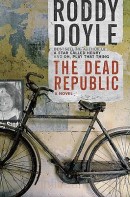 The concluding novel in Doyle’s “Last Roundup” trilogy about a character named Henry Smart whose long life coincides with the 20th-century history of Ireland, The Dead Republic
The concluding novel in Doyle’s “Last Roundup” trilogy about a character named Henry Smart whose long life coincides with the 20th-century history of Ireland, The Dead Republic starts with Smart’s return to Ireland in 1951 after eventful years in America. (The first two books were A Star Called Henry
and Oh, Play That Thing
.) Henry has consulted with American director John Ford on his movie The Quiet Man, only to realize that Ford’s views of Ireland are entirely sentimental and insufficient.
Opinion of the novel seems divided almost exactly down the middle by the Atlantic Ocean. In the UK’s Telegraph, Brian Dillon says that “Doyle works hard to corral the whole of post-war Irish society to fit his hero’s picaresque shenanigans—with increasingly schematic and unconvincing results.”
And the Guardian criticizes the work in not one, but two reviews. Tim Adams writes: “There is a difference between dialogue and voice, and while Doyle is a master of the former—it was his ear for the vernacular that drove his early books to their comic heights—his attempts at an interiorized, rather than a spoken, idiom have generally been less convincing.” And Christopher Tayler follows that up with: “Over-schematic and under-planned, it’s a disappointing end to Doyle’s ambitious trilogy, though the improvisatory quality of Henry’s wanderings often generates powerful individual scenes.”
Enthusiastic reviewers in the States beg to differ. Martin Rubin, writing in the San Francisco Chronicle, says the novel “leaves the reader profoundly enlightened about the true Ireland in all its terrible glory.” In the New York Times, Tom LeClair judges The Dead Republic as the best book in the cycle, “allowing the characters to have long talks with (and against) one another and giving readers time to think about the brutal intersection of religion, economics and politics in Ireland.”
And finally, in the Los Angeles Times, Tim Rutten writes:
[T]he larger purpose behind [the] trilogy . . . comes clearly into view, and it’s no less than a smackdown of popular culture’s contribution, particularly as refracted through the lens of Irish American sentimentality, to the mythology of Irish nationalism. Doyle’s is hardly the first hand to work this crooked intellectual furrow, but no one before him has made the excavation even half so entertaining.
The Dead Republic by Roddy Doyle
Viking, 336 pp., $26.95

